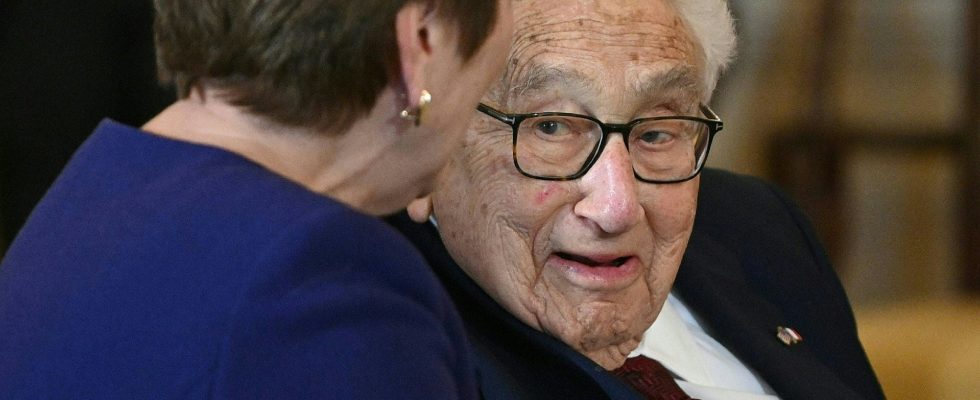It was the last giant of the Cold War who died on November 30. Celebrated and controversial diplomat, Nobel Peace Prize winner for the end of the Vietnam War, criminal against humanity in Cambodia and Chile for his most virulent critics, Henry Kissinger was the architect of détente with the Soviet Union and the opening to Mao’s China. Brilliant academic at Harvard, his work on Metternich, Bismarck as well as his masterpiece Diplomacy marked the students of the realist school of international relations and delighted the French who found Richelieu as the father of modern foreign policy.
Worried about the permanent pendulum swing between isolationist withdrawal and interventionist messianism specific to American diplomacy, the German Jew who arrived in the United States in 1938 at the age of 15 to flee Nazism, had a horror of chaos and instability. But Kissinger’s realism is not the often caricatured amoral cynicism, or the constant search for compromise. For him, a stable international order must combine power and legitimacy: the balance of powers, and a unifying principle recognized by the different actors. It is this dosage which allowed the Europe of the Congress of Vienna to maintain relative peace after 1815, after the victory against the Napoleonic revolutionary power: monarchical conservatism and the reciprocal security of the powers.
“Non-belligerence”
The Yom Kippur War, provoked by the surprise attack of Egypt and Syria against Israel in 1973, put these principles into practice. Kissinger quickly sees that the crisis, six years after the humiliation of the Six-Day War, can reshuffle the cards. It is not the search for a very abstract peace that animates Kissinger in the Middle East, but the progressive and prudent construction of stability based on “non-belligerence”, and of course the defense of American interests in the face of ‘Soviet Union. “The basic dilemma of our time is that if the search for peace becomes the sole objective of a policy, the fear of war becomes a weapon in the hands of the most brutal actors: this produces moral disarmament,” he writes. . But recognition of the tragedy of history is not the refusal of action.
Secretary of State and national security advisor to the White House (no one subsequently combined the two positions), Kissinger, in October 1973, had to do without a Nixon entangled in the middle of Watergate and often in a state of intoxication . He understands that war can create opportunities if America can save Israel from catastrophe, without humiliating its enemies. The United States sets up a massive airlift to arm Israel and help it win, but also uses this military aid to prevent Israeli leaders from destroying Egypt’s Third Army or marching on Arab capitals. The Israeli public will maintain a lasting animosity against this American with a discreet Judaism accused, wrongly, of having been slow to support Israel. In the mediation that followed, Kissinger went to great lengths to build trust with Egyptian President Sadat and plead his case to Israeli leaders. The United States also assumes the balance of power with Moscow, going as far as a state of nuclear alert, to prevent the deployment of Soviet troops, the most intense moment of tension since Cuba.
Israel’s vulnerability
Throughout this period, Kissinger did not forget the condition of existential vulnerability that gripped Israel. Perhaps his personal experience makes him more sensitive to it. He is always aware of the sacrifice required of Israelis: exchanging territories, a tangible factor, for political commitments of recognition, based on intangible trust. No diplomatic advance can do without robust American security guarantees.
The end of the Yom Kippur War is a diplomatic triumph for Washington. Kissinger managed to strengthen the strategic alliance between the United States and Israel, to detach Egypt from the relationship with its Soviet sponsor, in fact expelling Moscow from the balance of power in the Middle East until Putin’s intervention to saving Assad in Syria in 2015, and laying the foundations for Israeli-Egyptian peace, the first Israeli-Arab agreement, concluded under the aegis of Jimmy Carter at Camp David in 1978. Of course, the comparison with the current situation has its boundaries. Kissinger, like most leaders of the time, ignored the Palestinian question, seen as negligible in the face of the great powers.
And the region had leading statesmen like Egyptian President Anwar Sadat, assassinated for taking the risk of peace, to whom Kissinger pays homage in his latest book Leadership. But as the war provoked by the Hamas attack rages, the lessons of Kissinger, one of the few American diplomatic successes in the region, can enlighten us.
* Benjamin Haddad is deputy (Renaissance) of Paris.
.
